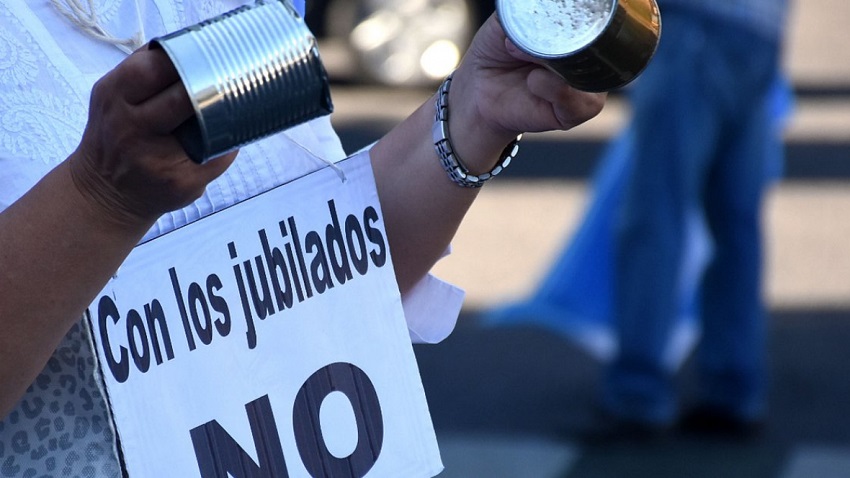
In the last 9 years The purchasing power of retirement pensions fell by 50% because the increases were behind inflation. This is the result of the successive changes in the pension mobility law that have been promoted by the different governments, since this law is the one that periodically adjusts the pensions.
According to the calculations of The Left Daily Economy based on the evolution of assets and the CPI (Indec and CABA), From October 2015 to July 2024, inflation has accumulated an increase of almost 10,000%, while salaries have increased by less than 5,000%. Those who earn above the minimum wage are the ones who lost the most, due to the effect of the flattening of the pyramid during the Frente de Todos government.

Overall, the maximum salaries lost 53%minimum wages (without bonus) fell 49% in real terms, while the assets with bonuses lost 33% between 2015 and 2024.
To buy the same as in December 2019, the minimum retirement that in August was $295,000 (with bonus) should be $445,000; while the basket of retirees prepared by the Office of the Ombudsman for the Elderly of the City of Buenos Aires is located at $850,000.
With the government of Macri pensions had a real loss of 21% compared to inflation. One of the worst adjustments in history. Then, with Alberto Fernandezthe assets began to be further fragmented, with the establishment of discretionary bonuses to the minimum salary, which are now given to mercy the “advantage” of adjusting for free, with the sole fact of not increasing the bonus, since it is not integrated into the assets. Milei boasts of an improvement in assets: a lie since in the first place took them to the lowest level in history, in February 2024.
Milei actually now claims that during his government “pensions flew away.” But this is a discretionary cut in this little story. In the first months of his government all real assets plummeted, and then began a lukewarm recovery that barely returned to its initial level of December, but for minimum pensions with bonus, which more than 3 million retirees receive, the loss is still close to 6%. This is because the bonus was frozen at $70,000 since March.
Journalist Ismael Bermúdez made the following calculation: “In December 2023, the minimum pension plus the bonus amounted to $160,713 and in September it will be $304,540. An increase of 89.5%. Inflation in July was 87%, plus 3.8% in August and the same in September, will add up to 101.5%. The difference of 12 points is a loss of 6%.”
Likewise, when compared to the values of a year ago, pensions are still far behind. According to figures provided by the Congressional Budget Office (OPC), the average purchasing power of pensions in the first seven months of 2024 fell 29.2% compared to the same period last year, while minimum pensions with bonuses lost 18.5% year-on-year.
The Congressional Budget Office reported that the average purchasing power of pensions in the first 7 months of 2024 fell, compared to last year, by 29% in total and 18.5% for the minimum pension with a bonus.
Rather than soaring, as Milei said, pensions plummeted. pic.twitter.com/3z2fv7O6Rb— Nicolas del Caño (@NicolasdelCano) September 2, 2024
On the other hand, the new pension law that the government wants to veto only involves a recomposition of the 8.1 percentage points lost with inflation in January, which in practice represents an increase of 7.2% in nominal benefits, and a new minimum income threshold linked to the Poverty Basket per adult equivalent, plus 9%. In total, the new law represents only an increase of about $17,000 for retirees who receive the minimum benefit. Not only does it not compensate for this year’s loss, but it is far from repairing all that was adjusted by previous governments.
The left proposes that there should not be a single beneficiary of the pension system who receives less than a minimum pension equivalent to the Retirees’ Basket, currently around $845 thousand pesos, according to estimates by the Office of the Ombudsman for the Elderly. Secondly, to grant 82% of the highest salary in activity (not above the SMVM).
The accusation that there would be no money to pay for this basic improvement in the standard of living is totally false. The problem for capital is that it does not want to give up a single cent of value so that workers, whatever their task, condition or gender, can live a full life. By restoring employer contributions to the 33% in force before the Menemist reform promoted by Domingo Cavallo, eliminating all types of exemptions from contributions, restoring export withholdings and tax benefits in favor of companies operated since December 2015, together with other tax modifications to business profits and financial speculation, it is possible – and desirable – to sustain better retirements and pensions.
This Wednesday, September 4, let us all join the mobilization in front of Congress called by retirees at 3 p.m. to reject President Javier Milei’s total veto of the new retirement mobility law.
Source: www.laizquierdadiario.com

